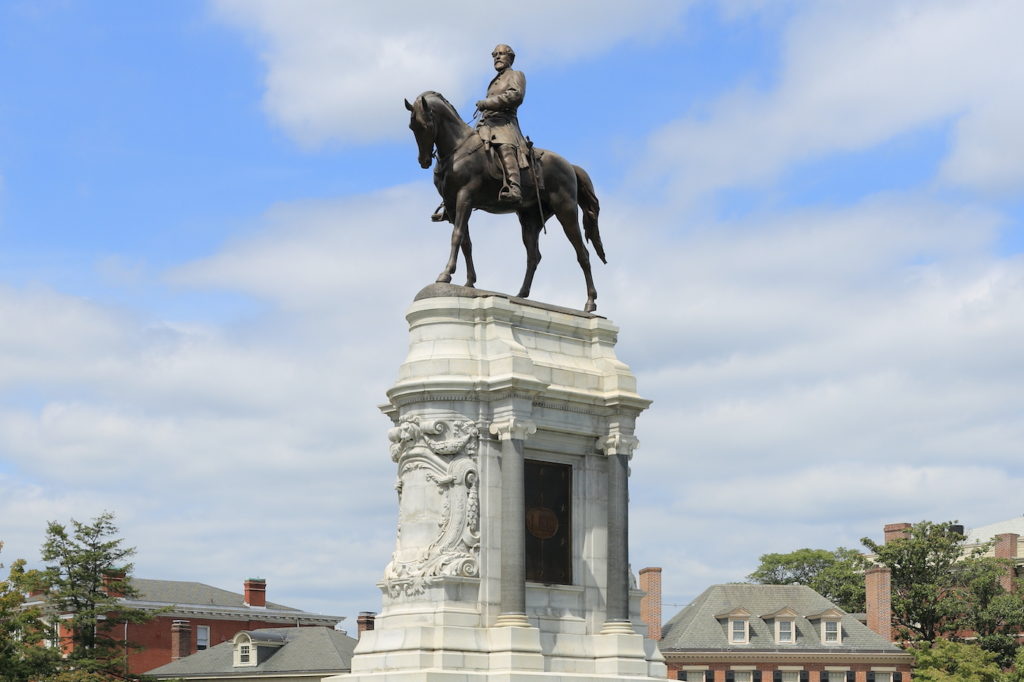In his foreword to the one-volume abridgment of Douglas Southall Freeman’s classic, Pulitzer-prize-winning 1936 biography on Robert E. Lee, James McPherson provides a list of Lee’s traits that appeared “in the index of the original four-volume biography” under the category “Personal Characteristics.” Get comfortable.
Abstemiousness, alertness, amiability, boldness, calmness, charm of manner, cheerfulness, courage, courtesy, dignity, diligence, fairness, faith in God, friendliness, generosity, goodness, good judgment, good looks, grace, heroic character, humility, integrity, intelligence, justice, kindness, mercy, modesty, patience, poise, politeness, resourcefulness, sincerity, tact, thoughtfulness, and wisdom.
If Freeman, whose father served under Lee right down to the end at Appomattox, can be said to occupy the panegyric pole of Lee interpretation, Allen C. Guelzo of Princeton University might be expected to occupy the other. He lays his cards on the table on the very first page of Robert E. Lee: A Life: “I was literally catechized at my grandmother’s knee in the righteousness of the Union War,” and Lee’s crime “rankles me to the sole of my abolitionist boots.” Anyone familiar with Guelzo’s acclaimed books on Abraham Lincoln won’t be surprised by this confession.
But by the time we reach the last page, Lee has hardly been torn to shreds. What emerges instead is a portrait not unlike the one peering off the dust jacket: thoughtful and appealing, yet facing two directions at once. Those who share the author’s Union commitments may find themselves wishing they could admire this complicated man more than they do.
Start your day with Public Discourse
Sign up and get our daily essays sent straight to your inbox.The puzzle at the heart of the book is: how and why did a man known for personal honor betray his country by siding with a violent rebellion in defense of chattel slavery?
By giving us Lee in all his complexity, Guelzo strides into the no-man’s-land between two warring camps: hagiography and revisionism. As Guelzo notes, Freeman ultimately concluded that there was “no mystery” at all to Robert E. Lee, that he really was essentially good and straightforwardly so.
Many of Lee’s most zealous detractors have often taken a similarly reductive approach, finding him essentially wicked and straightforwardly so. Lee: A Life rejects both readings, substituting in their place a perceptive character study attuned to the strange contradictions that seem to pepper his life.
And foremost among these contradictions is the puzzle at the heart of the book: how and why did a man known for personal honor betray his country by siding with a violent rebellion in defense of chattel slavery?
The Loss of a Father
According to Guelzo, much in Lee’s life can be traced back to his abandonment, at the tender age of six, by his erratic father, the Revolutionary War hero “Light Horse” Harry Lee. Light Horse Harry excelled as a cavalry officer under George Washington and enjoyed a stint as governor of Virginia, but soon began a steady descent that included financially ruinous land ventures and a flight to the Caribbean. His departure separated him for good, not only from his creditors, but also from his family. Deprived of paternal care, Robert was consigned to grow up in the shadow of his father’s ambiguous legacy.
The loss of Light Horse Harry also thrust Lee into a caretaker role at a young age. He would “’be seen carrying [his mother] in his arms to the carriage, and arranging her cushions with the gentleness of an experienced nurse.’” When he decided to enter West Point, his mother felt the loss keenly. “‘How can I live without Robert?’ she wailed. ‘He is both son and daughter to me.’”
Lee’s contrast with Light Horse Harry is stark, showing how fully Lee absorbed the lessons furnished by his father’s life. Where the father had been untrustworthy, the son would be scrupulously dutiful; where the father had burned through cash (his own and others’), the son would be obsessively frugal; where the father had been known for his furious temper, the son would keep his own under rigid control.
The Lees’ financial struggles did not make them paupers, but did throw them back on their extensive family network in Virginia. The experience implanted in Lee an abiding longing for independence and security. Because these two ideals can easily collide—independence often risks financial insecurity, while security can come at the risk of dependence on others—something very close to perfection would be necessary to attain them both.
As Guelzo summarizes, Lee would “fulfill the role his father had abandoned; he would sacrifice himself to perfect the imperfections Light Horse Harry had visited on the Lees. The pursuit of redemptive perfection lies behind much of the marble model that met so many people’s eyes.”
Marble or Man?
Lee does not seek to debunk or disprove this famous image of its subject as a “marble man,” so much as to explain its origin in Lee himself. This objective prompts a close analysis of his character, which never seems to slip into gratuitous psychologizing (nor gum up the brisk narrative). As a result, we the readers get to see less marble—whether wiped spotless by worshipful Southern romantics or graffitied beyond recognition by vandals—and more man.
Like any man, Lee’s character was mixed. The letters Guelzo quotes reveal an affectionate and caring father and husband, whose celebrity among Southerners after the war never seemed to go to his head. He also freed his own slaves during the war. On the other hand, his ideal of perfection made him highly critical, and sometimes subtly willing to pin blame on others.
More seriously, he was an exacting master when in charge of slaves. Unlike George Washington, he exhibited little compunction about splitting up slave families. In one of the most unattractive episodes of his life, Lee’s fabled self-control broke down when he had three runaway slaves (one of whom was a woman) so savagely whipped that the overseer refused to carry out the order. It fell to a nearby constable—and according to one perhaps dubious account, to Lee himself—to carry it out.
We the readers get to see less marble—whether wiped spotless by worshipful Southern romantics or graffitied beyond recognition by vandals—and more man.
Lee, Slavery, and Secession
Clearly then, Lee was quite far from the quasi-abolitionist he is sometimes portrayed to be. But neither was he ever a believer in the institution as a positive good, famously calling it “a moral and political evil.” On balance, his attitudes toward slavery were negative, and it’s clear that protecting it formed no part of his own justification for siding with the Confederacy.
In fact, he stirred a hornet’s nest toward the end of the war when he pushed for recruiting slaves into the Army with the promise of emancipation. In the words of one Confederate official, “If it really be so, and if it were generally known, that Gen. Lee is, and always has been opposed to slavery, how soon would his great popularity vanish like the mist of the morning.”
If this makes Lee’s decision to fight for the Confederacy seem strange, his pre-war views of secession make it stranger still. As Guelzo writes, alternately quoting and interpreting Lee’s words,
In the same terms Abraham Lincoln would use, Lee insisted that the Constitution “was intended for a perpetual union . . . and for the establishment of a government, not a compact.” Secession was “anarchy . . . and not a government.” Even worse, he wrote to Rooney, “in 1808 when the New England states resisted Mr. Jefferson’s Embargo Law & the Hartford Convention assembled, secession was termed treason by a Virga. statesman. What can it be now?”
It wasn’t until after the war—when his legal defense against a federal treason indictment partly depended on it—that Lee began presenting the secessionist argument as legitimate.
Lee’s Lincolnian impulses are not entirely surprising. The Lee family’s political loyalties traditionally leaned in a nationalist direction. A favorite of George Washington, Light Horse Harry was an outspoken Federalist and thus a partisan of national, as opposed to state, power. According to Guelzo, the small hints of Lee’s pre-war political beliefs point to a basically similar outlook. He also served for decades in the greatest nationalizing force in the young republic, the U.S. Army. None of this suggests a strenuous apologist of states’ rights.
Then what did prove decisive for Lee? On Guelzo’s reading of the evidence, Lee’s loyalty to his native state had less to do with Virginia as a political entity and more to do with his
thick network of cousinage, including at least eighty other individuals and a lifetime of peregrinations from one extended relative estate to another. Many of these relations had been the rescuers of [Lee’s mother] Ann Carter Lee and her helpless offspring after Light Horse Harry Lee’s death. It was this fabulous skein of Carters, Fitzhughs, and other Lees, to whom Lee was knit by remembered obligations, that was the real Virginia Lee could not bring himself to oppose.
This filial loyalty was bolstered by concern for his family’s Virginia properties, which would certainly have been confiscated by a seceded Virginia had he sided with the Union (at the time, it was far from certain that secession would be followed by war, meaning the opposite danger— federal occupation—was still only hypothetical).
In this picture, a kind of duty does play a central role in Lee’s decision. But loyalty to family is a considerably more personal motive—for better or for worse—than the straightforward application of unquestioned principle, a wrinkle that may sit uncomfortably with Lee defenders and detractors alike. If anything, Lee’s decision seems to have come in spite of his principles—strong opposition to secession per se—as well as his moderate aversion to slavery (checkered personal history as a slaveowner notwithstanding). Still, it’s easy enough to feel some sympathy for his personal predicament.
Strangely then, Lee’s political opinions on the central questions of the Civil War are actually most sympathetic (to a Union sympathizer) at the very moment he made his fateful decision. In this man of contradictions, what is most appealing in Lee’s views nevertheless manages to lend support to the chilling words of one senator after Lee’s death: “I think it is safe to say that no one has committed the crime of treason against more light, against better opportunities of knowing he was committing it.”
The judgment that Lee was “a good man who made a bad decision” is silent on how the man made the decision that he did; the truism that “he was a product of his time” doesn’t begin to address the forces his time exerted on him, or to what extent he might have been free to resist them.
Real Insight about Lee’s Life
Readers will close the book understanding why Lincoln could look at a portrait of the Confederate chieftain and concede that his “is a good face. It is the face of a noble, noble, brave man.” Or why Ulysses S. Grant, despite condemning the Southern cause as “one of the worst for which a people ever fought, and one for which there was the least excuse,” was nevertheless not inclined to gloat “at the downfall of a foe who had fought so long and valiantly and had suffered so much.” Even Lee’s bitterest contemporary rivals could find something to admire in him, and one senses the same impulse in Lee, despite its author’s abolitionist boots.
But neither does the book succumb to the temptation to bustle past the gravity of Lee’s supreme misdeed with the book-length equivalent of “he was a good man who made a bad decision”—as if taking up arms against one’s own country in defense of human slavery were akin to a youthful indiscretion or a minor lapse in judgment. Like its cousin, “he was a product of his time,” the problem is not that the observation is entirely wrong as far as it goes; it’s that it doesn’t go very far.
At best, such comments only lead to the doorstep of understanding. The judgment that Lee was “a good man who made a bad decision” is silent on how the man made the decision that he did; the truism that “he was a product of his time” doesn’t begin to address the forces his time exerted on him, or to what extent he might have been free to resist them. Thankfully, Allen Guelzo takes us well past the doorstep and provides real insight. At a time when Robert E. Lee’s reputation is obscured by the fog of culture war, that is a valuable service.














